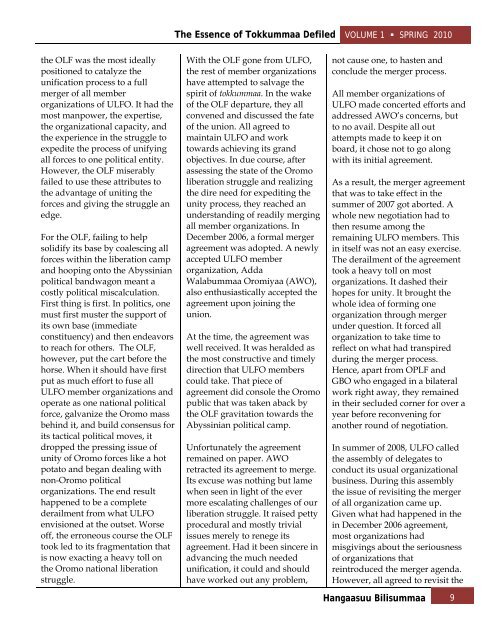Hangaasuu Bilisummaa Journal Volume 1 - ULFO
Hangaasuu Bilisummaa Journal Volume 1 - ULFO
Hangaasuu Bilisummaa Journal Volume 1 - ULFO
You also want an ePaper? Increase the reach of your titles
YUMPU automatically turns print PDFs into web optimized ePapers that Google loves.
the OLF was the most ideally<br />
positioned to catalyze the<br />
unification process to a full<br />
merger of all member<br />
organizations of <strong>ULFO</strong>. It had the<br />
most manpower, the expertise,<br />
the organizational capacity, and<br />
the experience in the struggle to<br />
expedite the process of unifying<br />
all forces to one political entity.<br />
However, the OLF miserably<br />
failed to use these attributes to<br />
the advantage of uniting the<br />
forces and giving the struggle an<br />
edge.<br />
For the OLF, failing to help<br />
solidify its base by coalescing all<br />
forces within the liberation camp<br />
and hooping onto the Abyssinian<br />
political bandwagon meant a<br />
costly political miscalculation.<br />
First thing is first. In politics, one<br />
must first muster the support of<br />
its own base (immediate<br />
constituency) and then endeavors<br />
to reach for others. The OLF,<br />
however, put the cart before the<br />
horse. When it should have first<br />
put as much effort to fuse all<br />
<strong>ULFO</strong> member organizations and<br />
operate as one national political<br />
force, galvanize the Oromo mass<br />
behind it, and build consensus for<br />
its tactical political moves, it<br />
dropped the pressing issue of<br />
unity of Oromo forces like a hot<br />
potato and began dealing with<br />
non-Oromo political<br />
organizations. The end result<br />
happened to be a complete<br />
derailment from what <strong>ULFO</strong><br />
envisioned at the outset. Worse<br />
off, the erroneous course the OLF<br />
took led to its fragmentation that<br />
is now exacting a heavy toll on<br />
the Oromo national liberation<br />
struggle.<br />
The Essence of Tokkummaa Defiled VOLUME 1 SPRING 2010<br />
With the OLF gone from <strong>ULFO</strong>,<br />
the rest of member organizations<br />
have attempted to salvage the<br />
spirit of tokkummaa. In the wake<br />
of the OLF departure, they all<br />
convened and discussed the fate<br />
of the union. All agreed to<br />
maintain <strong>ULFO</strong> and work<br />
towards achieving its grand<br />
objectives. In due course, after<br />
assessing the state of the Oromo<br />
liberation struggle and realizing<br />
the dire need for expediting the<br />
unity process, they reached an<br />
understanding of readily merging<br />
all member organizations. In<br />
December 2006, a formal merger<br />
agreement was adopted. A newly<br />
accepted <strong>ULFO</strong> member<br />
organization, Adda<br />
Walabummaa Oromiyaa (AWO),<br />
also enthusiastically accepted the<br />
agreement upon joining the<br />
union.<br />
At the time, the agreement was<br />
well received. It was heralded as<br />
the most constructive and timely<br />
direction that <strong>ULFO</strong> members<br />
could take. That piece of<br />
agreement did console the Oromo<br />
public that was taken aback by<br />
the OLF gravitation towards the<br />
Abyssinian political camp.<br />
Unfortunately the agreement<br />
remained on paper. AWO<br />
retracted its agreement to merge.<br />
Its excuse was nothing but lame<br />
when seen in light of the ever<br />
more escalating challenges of our<br />
liberation struggle. It raised petty<br />
procedural and mostly trivial<br />
issues merely to renege its<br />
agreement. Had it been sincere in<br />
advancing the much needed<br />
unification, it could and should<br />
have worked out any problem,<br />
not cause one, to hasten and<br />
conclude the merger process.<br />
All member organizations of<br />
<strong>ULFO</strong> made concerted efforts and<br />
addressed AWO’s concerns, but<br />
to no avail. Despite all out<br />
attempts made to keep it on<br />
board, it chose not to go along<br />
with its initial agreement.<br />
As a result, the merger agreement<br />
that was to take effect in the<br />
summer of 2007 got aborted. A<br />
whole new negotiation had to<br />
then resume among the<br />
remaining <strong>ULFO</strong> members. This<br />
in itself was not an easy exercise.<br />
The derailment of the agreement<br />
took a heavy toll on most<br />
organizations. It dashed their<br />
hopes for unity. It brought the<br />
whole idea of forming one<br />
organization through merger<br />
under question. It forced all<br />
organization to take time to<br />
reflect on what had transpired<br />
during the merger process.<br />
Hence, apart from OPLF and<br />
GBO who engaged in a bilateral<br />
work right away, they remained<br />
in their secluded corner for over a<br />
year before reconvening for<br />
another round of negotiation.<br />
In summer of 2008, <strong>ULFO</strong> called<br />
the assembly of delegates to<br />
conduct its usual organizational<br />
business. During this assembly<br />
the issue of revisiting the merger<br />
of all organization came up.<br />
Given what had happened in the<br />
in December 2006 agreement,<br />
most organizations had<br />
misgivings about the seriousness<br />
of organizations that<br />
reintroduced the merger agenda.<br />
However, all agreed to revisit the<br />
<strong>Hangaasuu</strong> <strong>Bilisummaa</strong> 9


